The survey was sent to 56 UAB division directors and 19 department chairs for whom CME is a baseline requirement for practice. We received 27 responses (36%) comprising 21 Division Directors and six Department Chairs. Overall results are presented below. We would still like to hear from you, and can resend the survey link to you, just let us know.
Thanks,
Your CME Team
{tab=Results summary}
Results Summary
- Medical knowledge and improving quality of care remain the top perceived added value aspects of a CME program
- CME activities are perceived to be relatively effective in ensuring physicians put new knowledge into practice and that physicians can provide accurate information to their patients
- You expressed substantial interest in engaging with the UAB CME team to help physicians earn MOC Part II and MOC Part IV credit
- There was a moderate recognition of the potential of CME to contribute to a department's strategic objectives - an avenue we would like to explore further
- You expressed substantial interest in the potential of CME activity and services to increase the external profile of departments. We work with UAB physicians, the UAB Health System, and several medical education organizations to develop CME content that can showcase UAB faculty expertise and system standard of care, and we're interested in working with you on related projects.
{tab=Action Plan}
Action Plan
- Outcomes assessment as a mechanism to enhance education effectiveness is at the top of our agenda, so if you're interested in working on an assessment project for your education program, please email us and we can arrange a meeting with the appropriate person to discuss details.
- We have implemented several projects for awarding MOC Part II credit for both live events and regularly scheduled series and can investigate, develop, and deploy options for your specialty
- We're interested in linking MOC Part IV requirements to specific projects that benefit both faculty and the institution. If your faculty need to complete performance improvement activities as part of their maintenance of certification, we have some ideas on how to implement a mutually beneficial program.
Detailed Results
{slide=Overall Value of CME}This question wasn't communicated effectively. Nine of 27 respondents chose not to answer the question.
Perception of the overall value of CME centers on the domains of increasing knowledge and improving quality of care, with 14 of 18 respondents ranking increasing knowledge as either 1 or 2 (highest and second highest value), while 8 respondents ranked improving quality of care as either 1 or 2, out of the 6 value-add items presented. The weighted average score in the graph below reflects an assignment of 6 points to a ranking of most important (#1), 5 points to a ranking of second most important, etc.
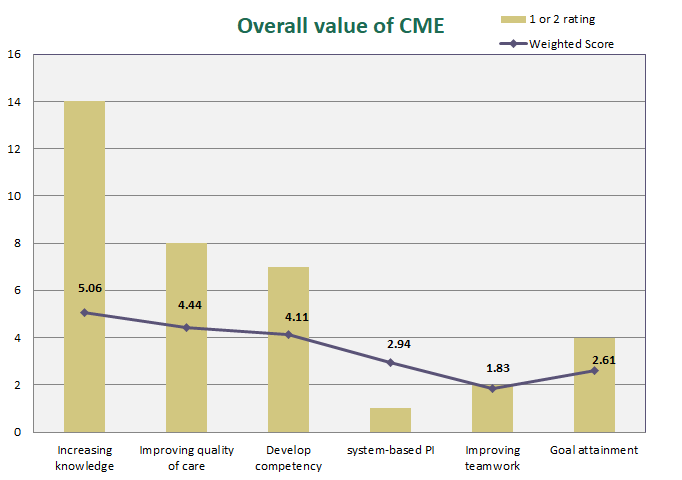
Once again, respondents do not perceive much contribution of CME activities to improving team work - an area, along with care coordination, heavily emphasized by our accrediting body, ACCME, as key to effective educational programs. Certainly, very effective team education is being conducted within your programs, what CME can bring to the table is analysis and design of activities to see if there are opportunities to enhance those learning experiences. These results track reasonably closely with our findings from 2019.
{/slide}
{slide=Effectiveness of CME}
Overall, 25 of 27 respondents see CME as effective in ensuring physicians can provide accurate information to patients (a 3 or 4 ranking), with a similar number (21 respondents) seeing CME as effective in both helping physicians understand indications and contraindications and put new knowledge into practice. This is consistent with responses to this question from December of 2019.
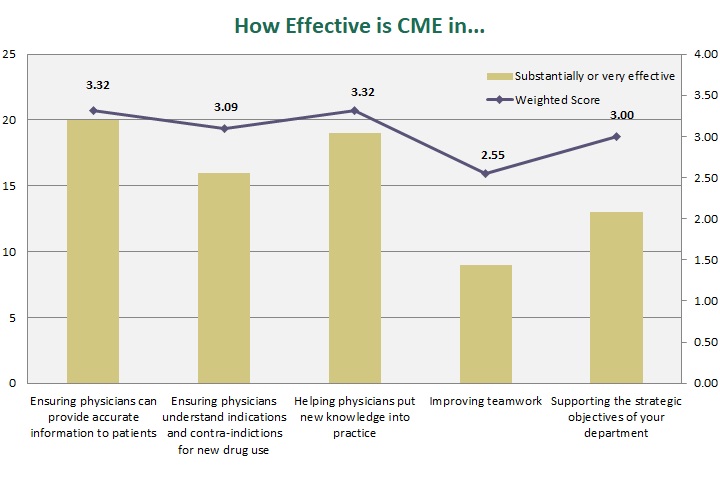
Improving teamwork was lowest rated in terms of effectiveness, with 12 of 27 respondents ranking CME as substantially or very effective. While 10 of 16 respondents presented with the question:
Would your unit benefit from an increase in education offerings that integrated other professionals such as nurses, pharmacists, and advanced practitioners?
said they would benefit substantially or significantly.
This is an area that we would like to improve on, and if your unit is interested in enhancing its team-oriented education we would like to work with you on that.
{/slide}
{slide=Interest in New Services}
You are most interested in how we can help provide MOC Part II and MOC Part IV opportunities for physicians, with 20 respondents identifying the Division of CME as playing a significant or key role in providing MOC Part II opportunities, and 16 responding similarly for helping with MOC Part IV credit. This represents an increase in interest in MOC Part IV credit options from 2019 results.
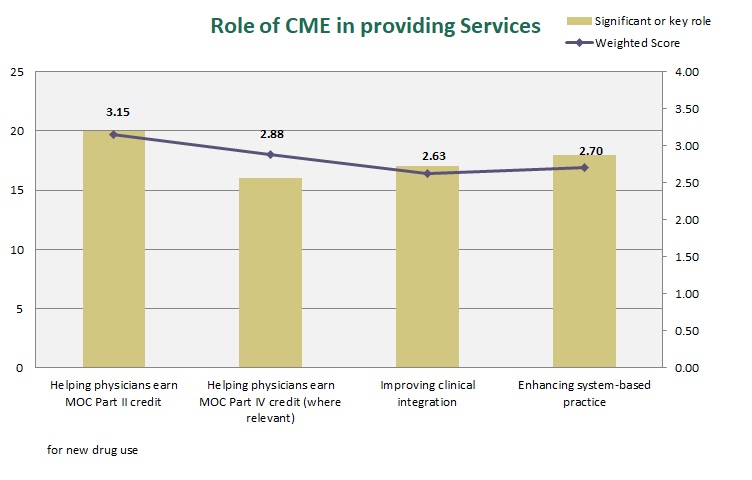
We have implemented several efforts to provide MOC Part II credit for live activities, regularly scheduled series, and enduring materials and are actively exploring other mechanisms to provide these services.
{/slide}
{slide=Usefulness of CME}
Overall, respondents think that CME could provide opportunities to raise the external profile of divisions and departments, with 19 respondents (including 4 of 5 chairs) rating such services as useful or very useful. The same number of respondents rated qualitative data collection and analysis services as useful or very useful.
We're very interested in discussing options for providing this type of support.
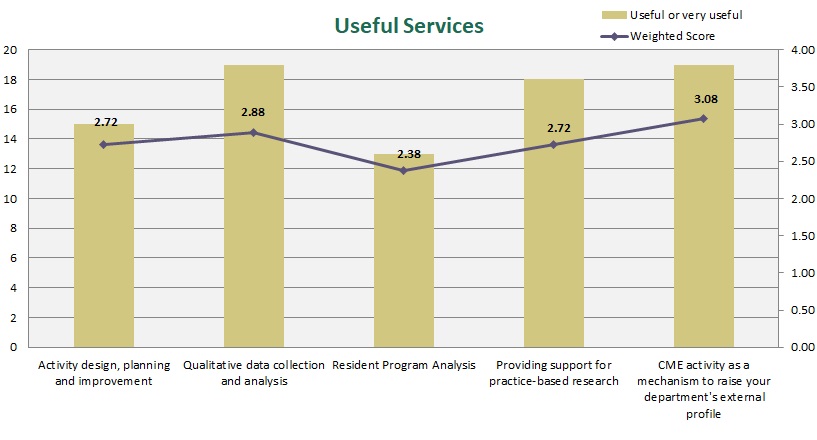 {/slide}
{/slide}{slide=Support for Maintenance of Certification}
These questions were presented to those who responded that the Division of CME can have either a significant or key role in helping physicians earn MOC Part IV credit through the ABMS portfolio program.
The most significant benefit identified using a weighted mean score was reduced duplication of effort on the part of faculty, with engagement in meaningful QI experiences also recognized as a potential benefit.(these questions were presented on a 3-point scale rating of minor, significant, or major benefit).
Thirteen of 15 respondents recognized reduced efforts as either of significant or major benefit, and 14 of 15 identified faculty engagement as such.
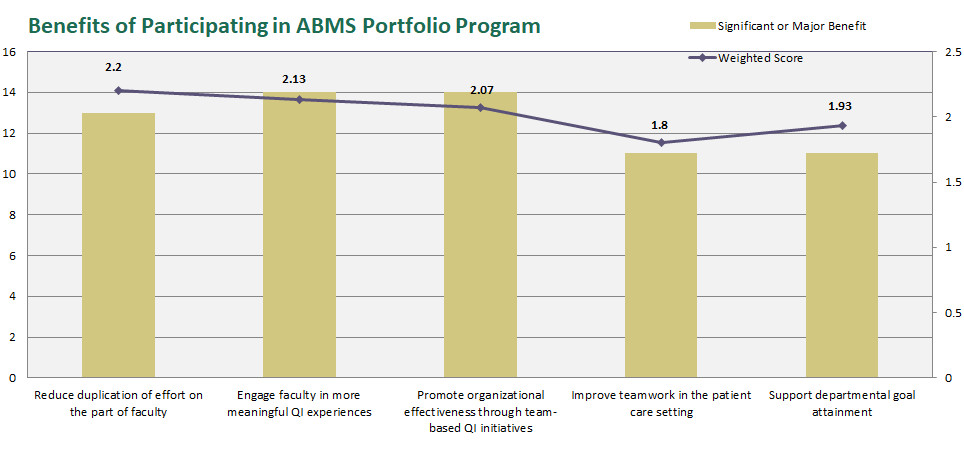
11 of 17 respondents indicated a willingness to participate in a pilot project to provide faculty with opportunities to earn MOC Part IV credit (this question was presented to those who responded that CME can play a significant or key role helping physicians earn MOC Part IV).
Maintenance of certification programs vary across specialties, but most have enough similarities across requirements to participate in ABMS' MOC Part IV portfolio program.
The aim of the program is to promote improvement in patient safety and quality of care while reducing administrative burden and providing faculty with opportunities to generate projects with publication potential. Ultimately, this approach can help create and sustain innovations and successful practices that can be shared across the institution to improve outcomes.
{/slide}
{/tabs}
.
.